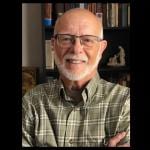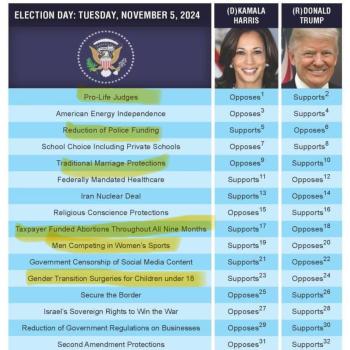i. The last verse of the book of Judges is like an epitaph for an era
Judges 21.25, NRSV: In those days there was no king in Israel; all the people did what was right in their own eyes.
It’s an epitaph because an era is dying. Israel is living under a Theocracy, the reign of God. Instead of kings, God has raised up prophets and judges.
However, Israel is about to enter an era of kings. It’s an era with a government God did not intend for them.
ii. July 4th just passed and I wonder about the state of America
I wonder if we are running the same risk in America.
What if an era is dying, an era founded on Judeo-Christian values?
What if we are entering an era with a form of government God did not intend?
Maybe the old Missouri philosopher Mark Twain said it best when he joked: “It was wonderful to find America, but it would have been more wonderful to miss it.”[1]
iii. Maybe it’s not just America, maybe it’s a Sign of the Times
I was visiting with Jamie Payne last Saturday. He’s a minister so he works for the Lord. But he’s also a Postman so he works for the actual government. He started asking me about the Last Times, an area of study that is NOT my forte. We both talked about End Times prophecies and the state of our nation.
After awhile he referred to Judges 21.25. He said it’s like everyone is doing right in their own eyes. Jamie has an eagle-eye on both Scripture and America.
That may be what we need to consider today. What are we doing? Or not doing? And what is right?
I’m writing this, not about us as a congregation, but about “We the people.”

America | Wrong, Right,
and Righteousness
iv. What is wrong?
We don’t have any problem pointing out what is wrong with society. There are too many wrongs for us to track, not to mention opinions.
Right now we are witnessing a morbid, yes morbid, focus on wrong. It’s “clickbait,” news and social media outlets know that negative headlines get more clicks than positive ones. We are drawn to the negative, to the wrongs.
Whole groups are doing wrong, simply because wrongs have been done.
Remember USA history, “2 wrongs never made an airplane, 2 Wrights did.”
The problem is that we don’t seem to know what wrong is, much less evil.
Isaiah 5.20: Ah, you who call evil good
and good evil,
who put darkness for light
and light for darkness,
who put bitter for sweet
and sweet for bitter!
Isaiah warns us that we can lose our moorings, forget good and evil
2 Corinthians 11.14: And no wonder! Even Satan disguises himself as an angel of light.
Evil is often an angel of light. We have all seen that great evil can be done to a victim in the name of justice. On the other hand, great evil can be done to our country in the name of a victim. Maybe we have all been deceived by an angel of light.
As Rev. Jamie Payne and Judges reminds us, doing whatever we think is right in our own eyes is wrong. As we see in Isaiah and 2 Corinthians, mixing up good and evil, light and darkness . . . is wrong.
v. Proverbs 14.34: Righteousness exalts a nation,
but sin is a reproach to any people.
We live in an age when everyone is offended by anything. Whole people groups are being offended and basically suffering “reproach.”
Reproach is only one symptom of the disease. The disease is “sin,” but how can we know what sin is, if we don’t know right from wrong, or light from darkness?
We don’t want to talk about sin anymore. The soul-sickness of sin is causing reproach, which is also translated disgrace.
Proverbs says sin is a reproach [or a disgrace] to any people.
However, “righteousness” has an opposite effect.
vi. What is right?
We as a people, have some real problems with the concept of right. These are my observations, not statistics.
1st Problem: We don’t understand right anymore.
Webster definition: “Right: conforming to facts or truth: CORRECT // the right answer.”[2]
This is a heady way of knowing right. “I conform, or live, according to facts. If I can just factcheck everything, the answers will be clear. I can live right.”
The problem is that all of the facts are being tweaked. You think it’s just the way the news is today . . . No, it’s part of Postmodernism. We are suffering the long-term effects of Deconstructionism. “You’ve got your facts. I’ve got mine. I can argue away your facts. I can argue away what seems right for you, if it doesn’t seem right to me.”
We don’t understand right anymore
2nd Problem: We have made right an individual choice instead of objective truth.
When we discover what we think is right we take a couple stances.
One stance is that we feel obligated to “tolerate” other forms of “right.” “I’m right. You’re wrong. I might try to explain it, but your choice is on your own head.” In other words, it’s not “politically correct” to try to correct.
Another stance is that we no longer take a stance at all. “I know I’m right, but I’m not going to stand up for what’s right.” Are we tired of swimming upstream?
We have made right an individual choice instead of objective truth.
“My view of right overrides community standards.” This is the basis for anarchy.
3rd Problem: We assume, “When we stop doing wrong, then we’re right.”
We make rules so people stop doing wrong, but more rules means more trouble.
Tom Morris, author of the book If Aristotle Ran General Motors, also used to teach at Notre Dame. He says this about rules:
Books of rules almost never help. The bad people will find loopholes and other ways around the rules, and the good people, who would do the right thing anyway, waste a lot of their time and energy checking what exactly the rules require before they act – ‘Wait a minute, I’ve got to be sure this complies with Rule 37, Part B, Clauses 1-3a’ – and then maybe action is too late.[3]
Making many rules is self-defeating. Not doing wrong is not the whole answer.
We assume, “When we stop doing wrong, then we’re right.”
Righteousness is not about the absence of wrong
as much as it is about the presence of right.
vii. What is wrong? What is right? What is righteousness?
Let’s take the Scriptures we’ve looked at so far
Judg 21.25: all the people did what was right in their own eyes.
Prov 14.34: Righteousness exalts a nation,
Isa 5.20: Ah, you who call evil good and good evil,
Right . . . Righteousness . . . Good . . . These are 3 different terms, written hundreds of years apart.[4] They are not tied together by a strict definition, but they are tied together by the way a community lives these terms out.
Today, the definition of “right” is up to the individual. From a Biblical perspective, there is no individual righteousness. There is no community righteousness either. There’s just righteousness. We’re either living right or we’re not.
viii. If we believe in Biblical righteousness, then we have some obligations
1st, we have an obligation to do right, and to be an example. Mark Twain quipped, “Always do right. This will gratify some people, and astonish the rest.”[5]
2nd, We have an obligation to be strong in the right, despite all odds. Abraham Lincoln declared, “Let us have faith that right makes might, and in that faith let us to the end dare to do our duty as we understand it.”[6]
3rd, We have an obligation to speak about what is right. Athanasius helped the world understand the Trinity. However, his views were not always accepted. In fact, people were dying in battle over various views. However, Athanasius understood what was right, and spoke out. Oh that the church in America would be able to declare what Athanasius does!
“If the world goes against the truth, then Athanasius goes against the world.”[7]
ix. May we remember voices from Church history and American history
May we remember that they have given us a call to action.
Righteousness is never a call to inaction. Righteousness is never established because we stop doing wrong. Righteousness is established when we do right.
The Golden Rule does not say: “Do not do unto others what you do not want them to do unto you.” No, it is a call to action. Our Lord Jesus Christ says:
Matthew 7.12: In everything do to others as you would have them do to you.
Series
This is the 3rd article in a 3-part series about July 4th, 2020. To view the other articles in the series, click on the following links:
Righteousness & America | July 5th Sermon
Pastor Jared Ingle
Long Lake Friends Church
4172 Church Rd.
Traverse City, MI 49685
[email protected]
facebook.com/longlakefriends
JC Ingle, Inc.
ministry, conferences, and counseling nonprofit
231.714.4154
[email protected]
notes:
[1] Bergen Evans, ed., Dictionary of Quotations (New York: Avenal Books, 1978), 21.[2] Mirriam-Webster, “Right,” Mirriam-Webster.com Dictionary, accessed July 1, 2020,
https://www.merriam-webster.com/dictionary/right
[3] Tom Morris, If Aristotle Ran General Motors: The New Soul of Business (New York: Holt
Paperbacks, 1997), 143.
[4] Judges 21.25: “right,” yashar noun, from root yashar verb. Proverbs 14.34: “righteousness,” tsedaqah noun, from root tsadaq verb. Isaiah 5.20: “good,” towb noun, from root towb verb.
[5] Evans, 593.
[6] Ibid, 219.
[7] Morris, 46.













